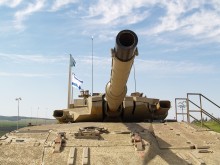The Israelis are fully committed to striking at Iranian targets in Syria to prevent an Iranian military stronghold in their northern neighbor as well as to defend the country from threats both near and far, Israeli Prime Minister Benjamin Netanyahu declared repeatedly in the last week. Meanwhile, he is also highlighting the economic trouble hitting Iran as the US reinstates sanctions on the country and what that could mean for a possible public uprising against the leadership in Iran.
“At a time when the US is economically striking at the Iranian regime, we are working to prevent Iranian forces and those of its proxies from establishing a military presence anywhere in Syria, and we will continue to do so,” said Netanyahu in comments released by his office on Sunday. That’s a similar message to what he said last Thursday at an IDF pilot graduation in other comments released by his office, stating that Israel “will continue to take strong action against Iranian targets in the area. We will defend our borders… We will continue to operate at close and longer ranges, both openly and in secret, against those who seek our lives.”
It’s more than just words and it’s more than just air power that is part of defending the border with Syria. On Sunday, the IDF Spokesperson posted to Twitter that “following a situation assessment in the Northern Command, it was decided to reinforce the 210th Division in the Golan Heights with additional armor and artillery troops.”
A follow-up tweet said that the IDF would “continue its non-intervention policy in the Syrian conflict, while reacting firmly to cases in which Israeli sovereignty or civilians are threatened.”
The increase in troops along Israel’s border comes as internal strife in Iran is making headlines again. Even Iranian Interior Minister Abdolreza Rahmani Fazli is acknowledging the conflict, claiming that violent protests on Saturday in the city of Khorramshahr were over water shortages, according to the semi-official Fars News Agency.
Meir Javendafar, an Iranian-Israeli commentator, reposted to Twitter a video from protests in the city, translating the crowd chants as “Death to Rouhani”—referring to President Hassan Rouhani—and more significantly, “Death to Khamenei”—referring to Iranian Supreme Leader Ayatollah Khamenei.
Netanyahu on Sunday pointed to economic issues in Iran as stirring up trouble. “The Iranian regime is feeling very well the coming reimposition of the economic sanctions against it,” said Netanyahu.
“The Iranian economy is at a low point. One needs to see the data in order to believe. Iran is investing billions of dollars in financing terrorism in the region and around the world, and in aggression in the region, instead of investing them in the Iranian people, and the Iranian people are protesting this, and rightly so.”
Last Thursday at the graduation, Netanyahu said that resumption of sanctions and other economic problems in Iran mean that the people there “are feeling in their pockets the consequences of the fundamentalist fanaticism of their rulers… Many in Iran understand that the regime of the ayatollahs is wasting precious resources on foreign military subversion instead of investing in civilian needs at home.”
Said Netanyahu, “I am speaking about Iran because it is the greatest threat to our existence and we are determined to block this threat. It is too early to say how things will develop but the direction is clear: The cash machine of Iran’s aggression has been shattered.”
(By Joshua Spurlock, www.themideastupdate.com, July 1, 2018)

